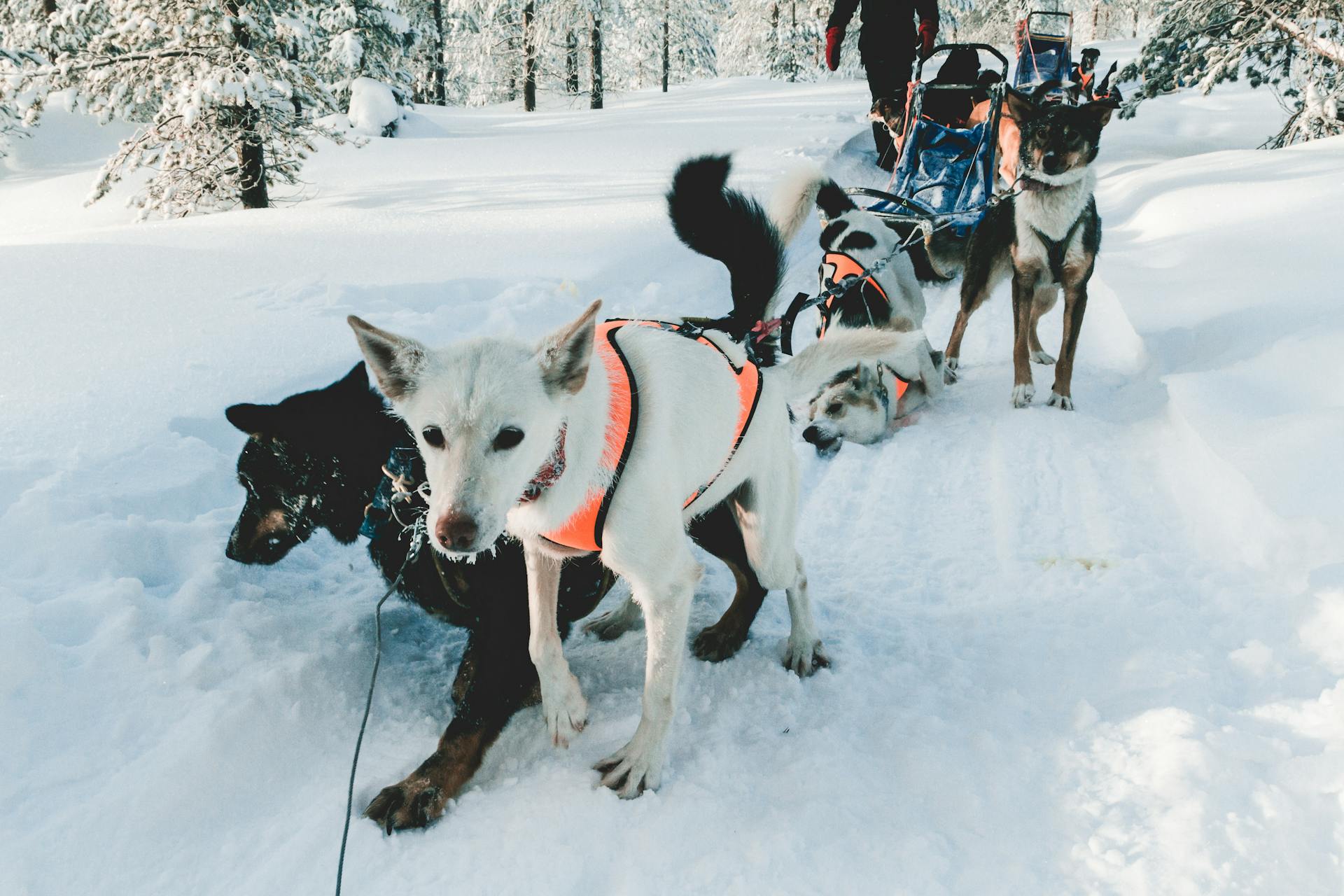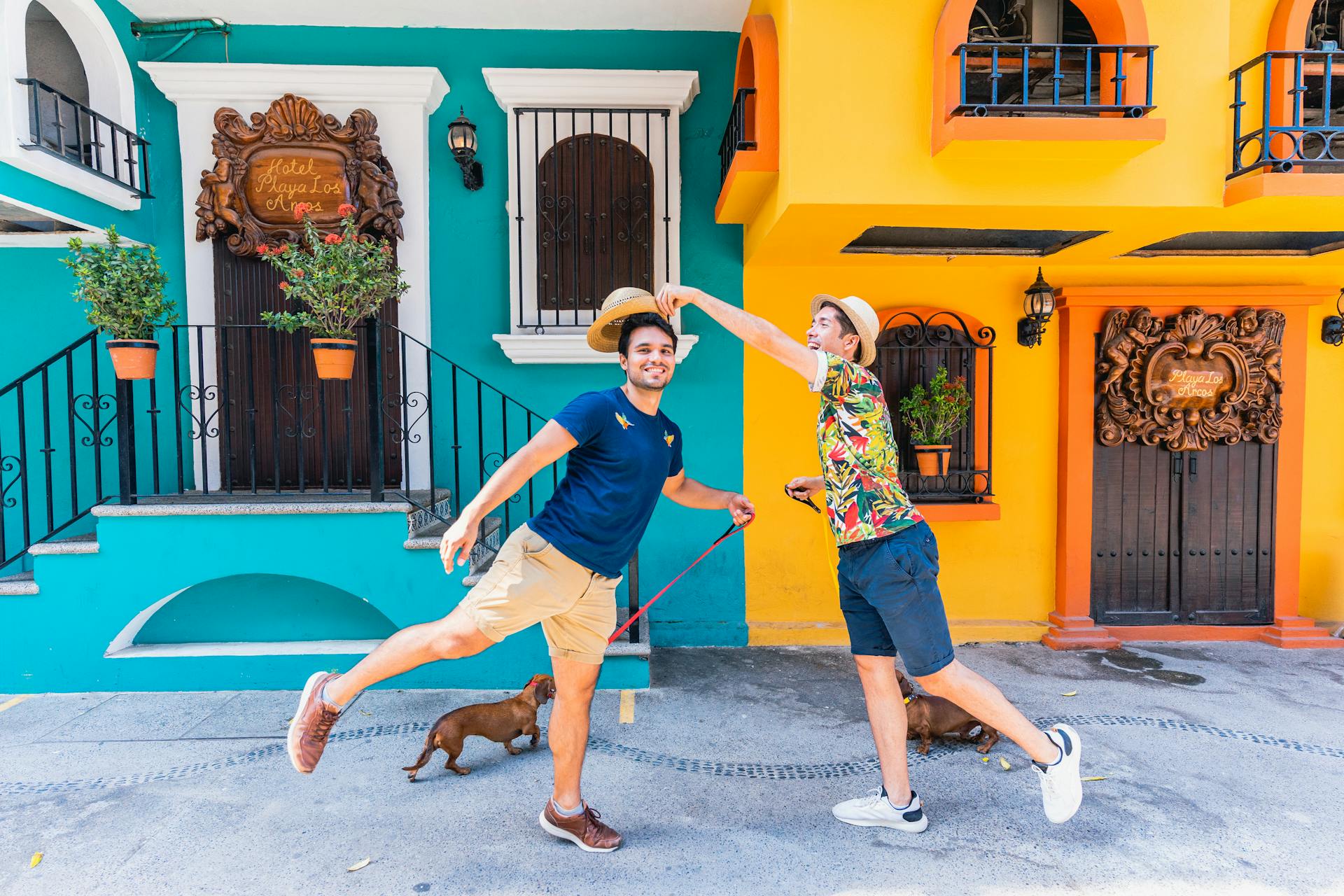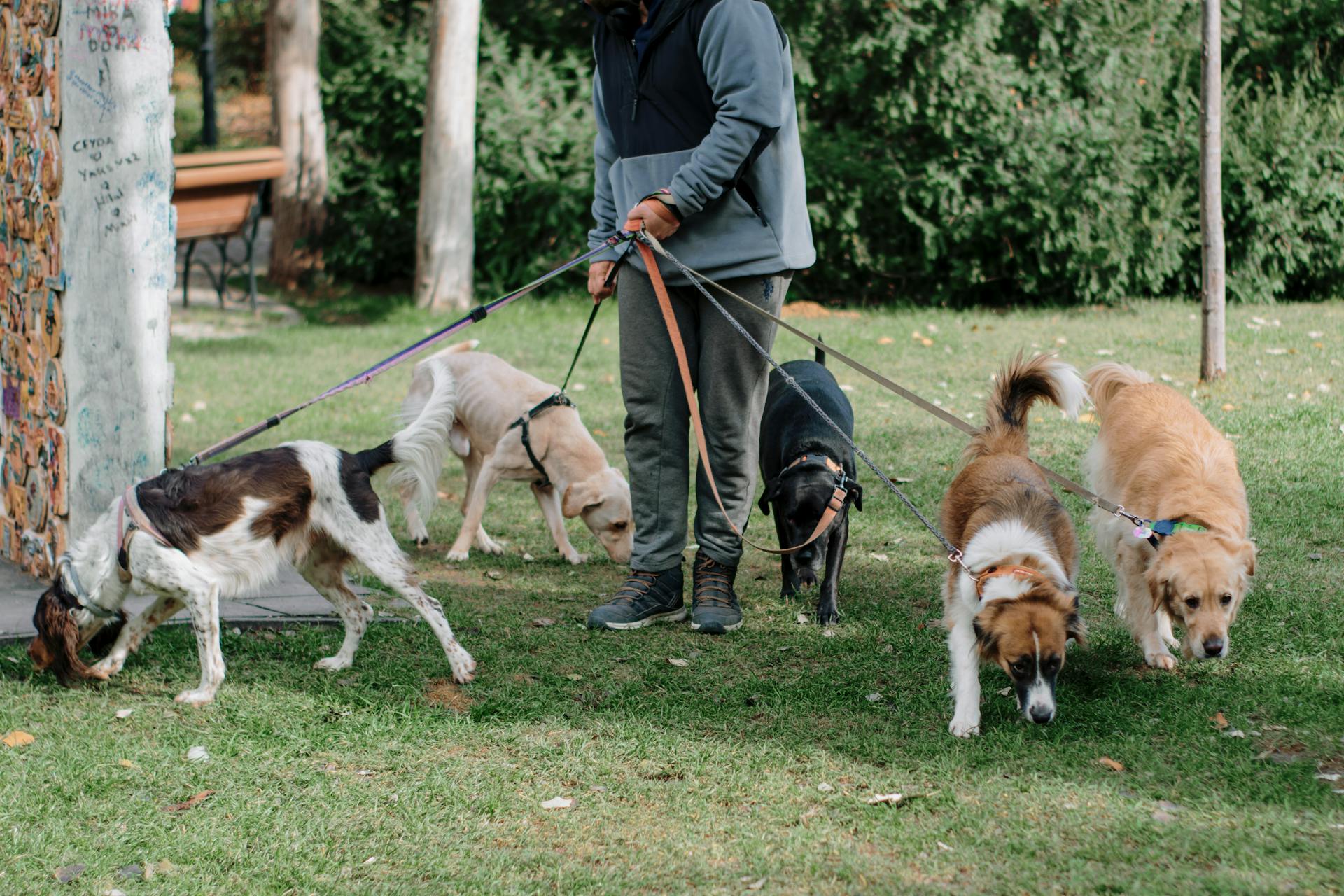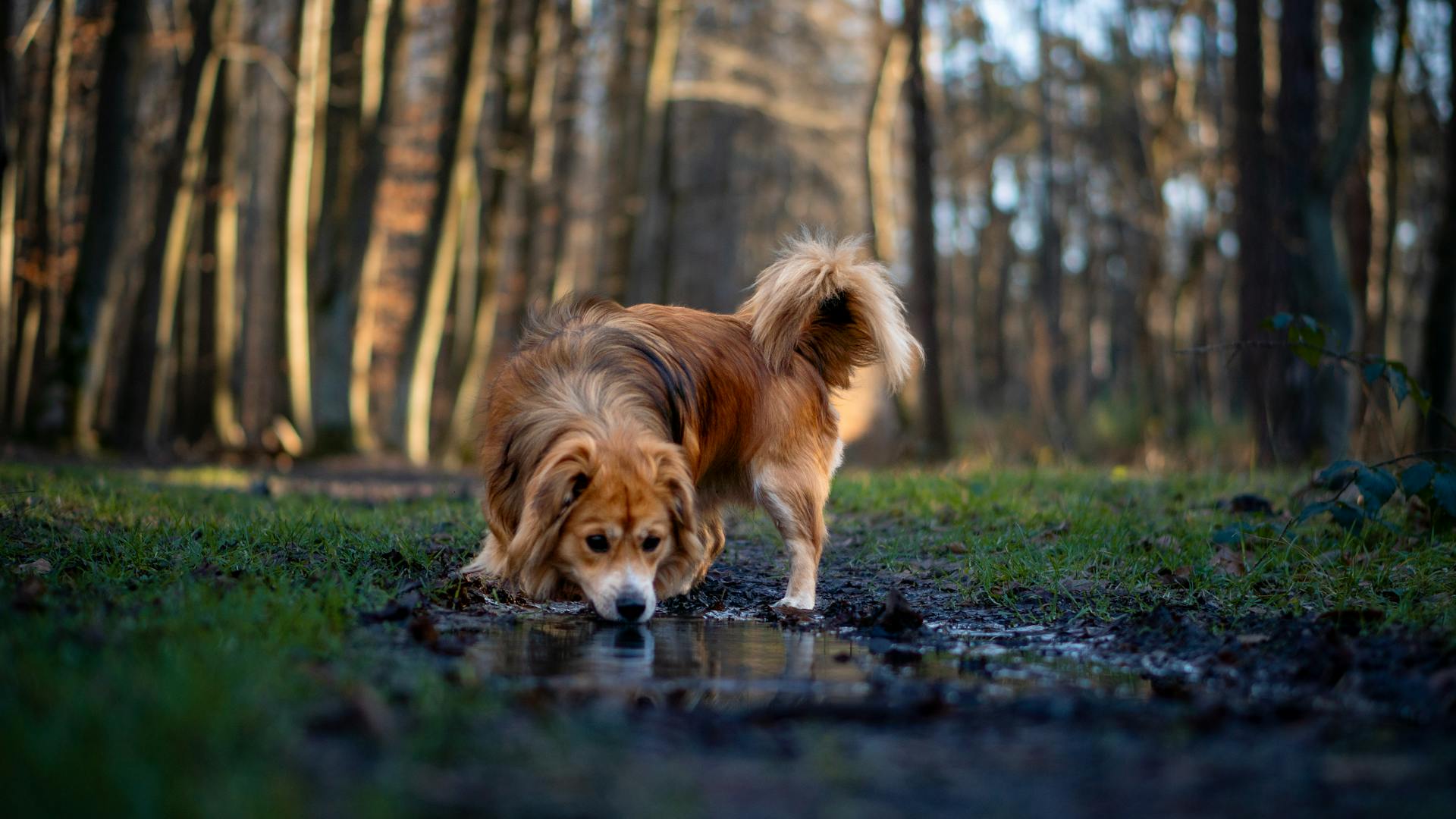
Dogs can indeed drink too much water, and it's not just about overhydration. Drinking too much water can lead to a condition called water intoxication, or hyponatremia, which occurs when the body takes in more water than it can process, causing an imbalance of electrolytes.
Drinking too much water can also cause dogs to vomit, leading to a vicious cycle of dehydration and overhydration. This is especially true for dogs that are prone to drinking quickly, such as those with anxiety or excitement.
One key sign of water intoxication is a swollen face, which can be a sign that your dog's body is retaining too much water. If your dog is drinking excessively, it's essential to monitor their behavior and watch for signs of overhydration.
In some cases, drinking too much water can even lead to seizures and in severe cases, death.
Recommended read: Dogs Not Drinking Water
What Is Excessive Water Consumption?
Excessive water consumption in dogs can be a cause for concern. It's essential to monitor your dog's water intake and watch for signs of overhydration.
Dogs can drink an excessive amount of water due to various reasons, including Cushing's disease, kidney infection/failure, urinary tract infections, hypercalcemia, or dog diabetes. These conditions can cause excessive thirst and urination.
If you notice your dog drinking or urinating more than usual, consult your veterinarian for a thorough physical examination and blood or urine tests. Your vet may ask you to measure your dog's water intake and separate them from other pets.
Maintaining proper hydration is crucial for your dog's health, and ignoring excessive water consumption can lead to serious health issues. Your vet can provide advice on how to manage your dog's water intake and address any underlying health problems.
Excessive water consumption can also be a sign of boredom in puppies, indicating they need more stimulation, toys, and exercise.
Explore further: Increased Water Intake in Dogs
Signs and Symptoms
If your dog has been playing in the water for too long, watch out for these signs and symptoms of water intoxication: lethargy, vomiting, bloating, restlessness, pale gums, drooling excessively, dilated pupils, and loss of coordination.
Some vets may not be able to diagnose this problem properly, so it's essential to be aware of these symptoms. In more serious cases, your dog may have difficulty breathing, develop seizures, and lose consciousness.
Here are the signs and symptoms of water intoxication in dogs:
- Lethargy
- Bloating
- Vomiting
- Loss of coordination (including stumbling, falling, or staggering)
- Restlessness
- Drooling
- Pale gums
- Dilated pupils
- Glazed eyes
Signs and Symptoms
If your dog has been playing in the water for too long, they may start to show some concerning signs. Lethargy is one of the first symptoms to look out for, followed by vomiting, bloating, and restlessness.
Dilated pupils and pale gums can also be indicative of a problem. Your dog may start to drool excessively, and in more severe cases, they may lose coordination and stumble or fall down.
Here are some common signs and symptoms of water intoxication in dogs:
- Lethargy
- Bloating
- Vomiting
- Loss of coordination (including stumbling, falling, or staggering)
- Restlessness
- Drooling
- Pale gums
- Dilated pupils
- Glazed eyes
If you notice any of these symptoms, it's essential to get your dog to a vet as soon as possible. In severe cases, water intoxication can lead to difficulty breathing, seizures, or even a coma.
How Much to Drink
If you notice your dog drinking or urinating more than usual, it's a good idea to let your veterinarian know. This can be a sign of a underlying disease process.
A thorough physical examination, along with blood or urine tests, can help your veterinarian determine the cause. You might be asked to measure your pet's water intake, so separate them from other pets if necessary.
To estimate your dog's daily water intake, measure how much water you add to their bowl and how much is left at the end of each day. You should also account for any water added to their meals.
A good rule of thumb is to ensure your dog gets at least 1 ounce of water daily for each pound they weigh. For example, a 20-pound dog needs at least 20 ounces of water every day.
A unique perspective: Do Dogs Need Water All Day
Risk Factors and Prevention
Dogs can be prone to water intoxication due to various factors. Small dogs are at a higher risk because their bodies can quickly accumulate excess water, leading to symptoms sooner than larger dogs.
Dogs with little body fat, such as those in agility training, are also more susceptible to water intoxication. Their lean physique means there's less fat tissue to absorb excess fluid, making them more prone to the condition.
Dogs with high energy levels or obsessive-compulsive behavior, such as those fixated on water hoses or sprinklers, are also at a higher risk. These dogs may ingest excessive amounts of water while playing or engaging in repetitive behaviors.
Here are some common risk factors for water intoxication in dogs:
- Small dogs
- Dogs with little body fat
- Dogs with high energy levels
- Dogs with obsessive-compulsive behavior
To prevent water intoxication, it's essential to limit playtime in the water, monitor your dog's behavior, and take frequent breaks to allow them to relieve themselves.
Risk Factors
Small dogs are particularly vulnerable to water intoxication due to their smaller bodies, which means water can build up in their system quickly.
Some breeds are naturally more prone to excessive water intake due to their high energy levels and obsessive-compulsive behavior. For example, agility dogs and dogs obsessed with water hoses or sprinklers are at a higher risk.

Dogs with little body fat are also more susceptible to water intoxication, as they have less extra fat tissue to absorb excess fluid in the body.
If your dog is a small breed, has little body fat, or is highly energetic, it's essential to monitor their water intake closely to prevent overhydration.
Here are some specific factors that increase a dog's risk of water intoxication:
- Small dogs
- Dogs with little body fat
- Dogs with high energy
- Dogs with obsessive-compulsive behavior
Prevention
Prevention is key to keeping your furry friend safe from water intoxication. Limit play time in the water to prevent excessive water intake, and take frequent breaks for your dog to pee and get rid of excess water in their body.
You should monitor your dog closely, especially if they like to bite water from a hose or sprinkler, or if they tend to lap up a lot of water in their kiddie pool. Remove them from the water source after a short while, and consider training them to play in the water without ingesting it.

If your dog loves to retrieve toys from water, use a flat type of toy or stick instead of a round one, as they have to open their mouth wider to hold on to a round object. Avoid having your dog dive under water to retrieve the toy, as this can lead to excessive water intake.
Small dogs, dogs with little body fat, high-energy dogs, and dogs with obsessive-compulsive behavior are more prone to water intoxication. Here's a quick rundown of the risk factors:
By understanding these risk factors and taking preventive measures, you can keep your dog safe and healthy while still allowing them to enjoy the water.
Treatment and Monitoring
If you suspect your dog has water intoxication, it's essential to get them to the vet or emergency clinic immediately. In severe cases, brain damage can occur very fast, so don't hesitate to seek help.
Treatment for water intoxication typically involves administering electrolytes intravenously to help stabilize the dog's sodium levels. Careful and gradual administration is crucial to avoid causing severe neurological problems.
A veterinarian may also use diuretics to help remove excess water from the dog's body, and drugs like Mannitol to reduce intracranial pressure due to brain swelling.
A different take: Mild Water Intoxication in Dogs
Treatment

If your dog has water intoxication, it's crucial to get them to a vet or emergency clinic immediately. In severe cases, brain damage can occur very fast.
Treatment for water intoxication typically involves administering electrolytes intravenously to help rebalance the dog's sodium levels. Moderation is key, as super-concentrated sodium can cause severe neurological problems.
Careful and gradual administration of electrolytes is a key part of treatment, as is using diuretics to help get rid of the excessive water in the dog. This can help hasten the removal of fluid and alleviate symptoms.
Veterinarians may also administer drugs such as Mannitol to decrease pressure in the brain, which can help prevent further damage. In mild cases, a dog will have a staggering gait, but they can eventually recover internal equilibrium and return to normal.
Here are some common medications that can lead to excessive thirst in dogs, which can increase the risk of water intoxication:
- Anti-inflammatory drugs like prednisone
- Heart failure drugs, such as furosemide
- Seizure medications like phenobarbital
In severe cases, the brain damage can be so advanced that it cannot be reversed, and the dog dies or must be euthanized.
Monitoring Consumption

Monitoring Consumption is a crucial aspect of your dog's health. Refill your dog's bowl at roughly the same time daily to notice changes in their thirst or drinking behavior.
Developing a water bowl routine is key to monitoring consumption. Fill the bowl to about the same level each time to help you track how much your dog is drinking.
Pay attention to how much water you put in each day and how much is left in the bowl. This will give you a good idea of your dog's water intake.
Here's a simple way to track your dog's water consumption:
- Refill your dog's bowl at roughly the same time daily.
- Fill the bowl to about the same level each time.
- Pay attention to how much you put in each day and how much is left.
Remember, water is critical to your dog's health and well-being. Never deprive your dog of water.
Frequently Asked Questions
Is it OK to limit a dog's water intake?
No, it's not recommended to limit a dog's water intake, as it can worsen certain conditions. Always ensure your dog has access to plenty of fresh water
Can a dog throw up from drinking too much water?
Yes, drinking too much water too quickly can cause a dog to regurgitate or vomit water. However, there are other concerns to be aware of when hydrating your furry friend.
Sources
- https://www.natural-dog-health-remedies.com/water-intoxication.html
- https://www.akc.org/expert-advice/health/can-dogs-drink-much-water-dangers-water-intoxication/
- https://www.petmd.com/dog/nutrition/evr_dg_the_importance_of_water
- https://www.webmd.com/pets/dogs/my-dog-always-thirsty
- https://thepetlabco.com/learn/dog/nutrition/dog-drinking-a-lot-of-water
Featured Images: pexels.com


